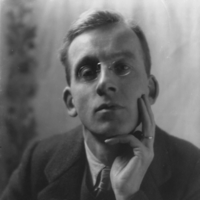The Crane
The biggest crane on earth, it lifts
Two hundred ton more easily
Than I can lift my heavy head:
And when it swings, the whole world shifts,
Or so, at least, it seems to me,
As, day and night, adream I lie
Upon my crippled back in bed,
And watch it against the sky.
My mother, hunching in her chair,
Day-long, and stitching trousers there—
At three-and-three the dozen pair . . .
She’d sit all night, and stitch for me,
Her son, if I could only wear . . .
She never lifts her eyes to see
The big crane swinging through the air.
But though she has no time to talk,
She always cleans the window-pane,
That I may see it clear and plain:
And as I watch it move, I walk
Who never walked in all my days . . .
And often, as I dream agaze,
I’m up and out, and it is I
Who swing the crane across the sky.
Right up above the wharf I stand,
And touch a lever with my hand,
To lift a bunch of girders high,
A truck of coal, a field of grain
In sacks, a bundle of big trees,
Or beasts, too frightened in my grip
To wonder at their skiey trip:
And then I let the long arm dip
Without a hitch, without a slip,
To set them safely in the ship
That waits to take them overseas.
My mother little dreams it’s I,
Up there, tiny as a fly,
Who stand above the biggest crane,
And swing the ship-loads through the sky;
While she sits, hunching in her chair,
Day-long, and stitching trousers there—
At three-and-three the dozen pair.
And sometimes when it turns me dizzy,
I lie and watch her, ever busy;
And wonder at a lot of things
I never speak to her about:
I wonder why she never sings
Like other people on the stair . . .
And why, whenever she goes out
Upon a windy day, the air
Makes her sad eyes so strangely bright . . .
And if the colour of her hair
Was brown like mine, or always white . . .
And why, when through the noise of feet
Of people passing in the street,
She hears a dog yelp or sheep bleat,
She always starts up in her chair,
And looks before her with strange stare,
Yet seeing nothing anywhere:
Though right before her, through the sky,
The biggest crane goes swinging by.
But it’s a lucky day and rare
When she’s the time to talk with me . . .
Though, only yesterday, when night
Shut out, at last, the crane from sight . . .
She, in her bed, and thinking I
Was sleeping—though I watch the sky,
At times, till it is morning light,
And ships are waiting to unload—
I heard her murmur drowsily:
“The pit-pattering of feet,
All night, along the moonlit road . . .
A yelp, a whistle, and a bleat . . .
The bracken’s deep and soft and dry . . .
And safe and snug, and no one near . . .
The little burn sings low and sweet,
The little burn sings shrill and clear . . .
And loud all night the cock-grouse talks . . .
There’s naught in heaven or earth to fear . . .
The pit-pat-pattering of feet . . .
A yelp, a whistle, and a bleat . . .”
And then she started up in bead:
I felt her staring, as she said:
“I wonder if he ever hears
The pit-pat-pattering of sheep,
Or smells the broken bracke stalks . . .
While she is lying sound asleep
Beside him . . . after all these years—
Just ninteen years, this very night—
Remembering? . . . and now, his son,
A man . . . and never stood upright!”
And then I heard a sound of tears;
But dared not speak, or let her know
I’d caught a single whisper, though
I wondered long what she had done
That she should hear the pattering feet:
And when those queer words in the night
Had fretted me half-dead with fright,
And set my throbbing head abeat . . .
Out of the darkness, suddenly,
The crane’s long arm swung over me,
Among the stars, high overhead . . .
And then it dipped, and clutched my bed:
And I had not a breath to cry,
Before it swung me through the sky,
Above the sleeping city high,
Where blinding stars went blazing by . . .
My mother, hunching in her chair,
Day-long, and stitching trousers there,
At three-and-three the dozen pair,
With quiet eyes and smooth white hair . . .
You’d little think a yelp or bleat
Could start her; or that she was weeping
So sorely, when she thought me sleeping.
She never tells me why she fears
The pit-pat-pattering of feet
All night along the moonlight road . . .
Or what’s the wrong that she has done . . .
I wonder if 't would bring her tears,
If she could know that I, her son—
A man, who never stood upright,
But all the livelong day must lie,
And watch, beyond the window-pane
The swaying of the biggest crane—
That I, within its clutch, last night,
Went whirling through the starry sky.

